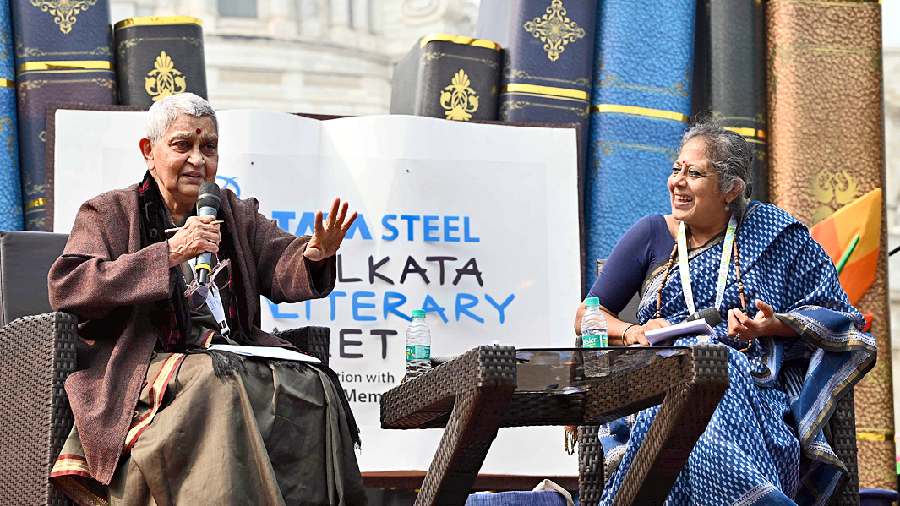Literature is health care for the soul, one of the leading academics of the world said at the city's annual date with books and the creative arts on Saturday.
“You don’t want literature, leave it behind. Your loss. You can't do anything if the whole society wants to refuse health care for the soul, which is what literature is,” Gayatri Chakravorty Spivak, literary theorist, critic and professor at Columbia University, said at the opening session of the Tata Steel Kolkata Literary Meet, in association with Victoria Memorial Hall and The Telegraph.
Spivak — known for her translation of and introduction to Jacques Derrida's De la grammatologie (Of Grammatology); her essay, Can the Subaltern Speak?; and considered one of the most influential postcolonial intellectuals — opened the 11th edition of the festival.
“Kolkata is my hometown and I have always been impressed by the deep appreciation of book culture seemingly present in a section of its middle class,” Spivak, who will turn 81 soon, said in her opening address.
In the first session that followed, she was in conversation with Lakshmi Subramanian, a teacher and researcher who has served in a number of universities in India and abroad.
“Why does literature matter? Why do humanities matter?” Subramanian asked Spivak.
Subramanian now teaches the social sciences in a science and technology school where, she said, she is “constantly confronted” by colleagues and students who say “why do we need literature and humanities”. Subramanian said she tries formulaic answers like “we are humans and it is not only about job literacy” but all of it sounds “anything but banal”.
It was then that Spivak described literature as health care for the soul.
She went on: “Literature is formation for the soul, which knows how to use the digital for good, rather than cybercrime and pornography. You name it, and cyber will do it. To an extent, unless you cook the soul you will not be able to use the dangerous and powerful thing that is the cyberworld for the good of the world. That is the basic utilitarian answer.”
Spivak brought in her experiences as a teacher at “the world’s most expensive university” as well as in small schools in Africa and rural pockets of Bengal, where she has been running schools for tribals and Dalits for four decades.
“The way our teachers taught us... you can't teach like that anymore. Down below, they can’t read because the primary schools are not schools anymore. As you well know, primary school jobs are sold. I know the people who buy these jobs. Also, it is a place for stealing rice. I say this not having read the newspapers. I am talking out of absolute experience. There, they don't know how to read, it is hard.
“But at the top, the superpowers' children, the ones reading English, French and German, they don't know how to read because what they are taught now is to control the text. They can summarise, and give historical background... their little heads actually make the literary text prove the little bit of nothing that they can think,” she said.
“As I said, I worked hard in Africa. There, the very big colonial schools are more or less like ours. But the smaller schools, the small universities, all they teach is entrepreneurship. Again, I am not speaking from reading books. I work with these students. I talk to them,” she said.
In her opening speech, Spivak remembered how she was taught literature by the legendary professor of English at Presidency College, Taraknath Sen.
“Sahitya — the Sanksrit word that is used as a synonym for literature in most of the north Indian languages — can be made to mean saha-ness, togetherness, even alignment. Following this possibility, our professor Taraknath Sen at Presidency College, now Presidency University, taught us to efface ourselves as far as possible and attempt to enter the space of the poem, to wish as it wishes, to experience it as a field of desire, from within.
“I have learned to call this way of teaching/reading hauntology. Reading is a prayer to be haunted. This is not a supernaturalising, but a transcendentalising gesture,” she said.
The behaviour of a government officer in a Birbhum village, towards the local population, was similar to what “literary” meant for Spivak.
“I met a charming civil services officer (in the village where Spivak runs a school) whose unpatronising behaviour towards the villagers impressed me. Among other things, he told me diffidently that he didn’t care for literature at all. I congratulated him and said most of the gush about literature was just that, just gush. That his behaviour toward the locals was what ‘literary’ meant for me, what I had been taught, to enter the space of the other,” she said.
